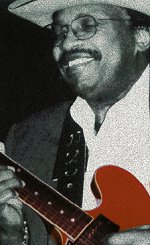Artisitic Arson: House of Blues, Take A Burn
By: Danielle Woodrich

I wanted to let In Music We Trust readers have a taste of the fine musical soul food out of Chicago. But there was a problem: the two new releases from Chicago's House of Blues Music Company, "Born to Play the Blues" by Larry McCray and Otis Rush's "Any Place I'm Going" disappointed the hell out of me. I'm afraid I must protect and spare you these two vapid efforts and at the same time impress that neither of the albums are representative of the working talent. Otis Rush is a brilliant guitarist, a participating hero in the Midwest's recording and performing scene since its Delta-electrified beginning in the 1950's. He has a huge volume of work and every fan I know of 'the West-side sound'? agrees that his recordings from the 60's and his live shows remain top shelf bourbon in an ever-expanding world of lite beer on tap. In addition to over twenty of his own releases, Rush contributed his vicious left-handed solos, painfully emotional chord phrasings and his deep mellifluous voice to the albums of Buddy Guy, Willie Dixon, Little Walter, even diversifying enough to lend his support to Ike Turner and Duane Allman too. He has inspired Jimmy Page, Eric Clapton, John Mayall and scores of others in the last 30 years.
Otis Rush is a brilliant guitarist, a participating hero in the Midwest's recording and performing scene since its Delta-electrified beginning in the 1950's. He has a huge volume of work and every fan I know of 'the West-side sound'? agrees that his recordings from the 60's and his live shows remain top shelf bourbon in an ever-expanding world of lite beer on tap. In addition to over twenty of his own releases, Rush contributed his vicious left-handed solos, painfully emotional chord phrasings and his deep mellifluous voice to the albums of Buddy Guy, Willie Dixon, Little Walter, even diversifying enough to lend his support to Ike Turner and Duane Allman too. He has inspired Jimmy Page, Eric Clapton, John Mayall and scores of others in the last 30 years.
Aside from the watered-down edge-shaved production, Rush's cooperation and homage-paying is evident in the songs chosen for "Anyplace I'm Going." His personality shines most true on Marvin Gaye's "Pride and Joy" and Sam Cooke's bitter tale "Laughin' and Clownin'" as well as the Nappy Brown favorite "The Right Time." Honest, people, if you hear Otis singing 'oh yes I say the night time, mmm dee doo is the right time boo dee doo to be with....to be with the one you love, baby' don't fight the urge to look longly into your sweet one's eyes even as your hands involuntarily move to start unbuttoning your pants. But a word to the wise: if you want to stay in the mood, you will have to skip more than 2/3 of the tracks.
 "Born to Play the Blues," Larry McCray's third album, is one small step for a bluesman, one giant leap for the Cross-Over Cause. My advice is to ignore it, don't buy it. I hate to say that because Larry McCray, ex-General Motors linesman and all round hard luck case is easily likable with his adept soulful picking style and his heartiness of voice and demeanor. He is charming and gifted, however what he is not is listenable. I admit it seems unsportsmanlike or simply mean to judge his latest work so harshly, but here his love of traditional blues and a life inspired by them is overshadowed by an awkward reach towards a paler gentler audience with crisper dollars to spend.
"Born to Play the Blues," Larry McCray's third album, is one small step for a bluesman, one giant leap for the Cross-Over Cause. My advice is to ignore it, don't buy it. I hate to say that because Larry McCray, ex-General Motors linesman and all round hard luck case is easily likable with his adept soulful picking style and his heartiness of voice and demeanor. He is charming and gifted, however what he is not is listenable. I admit it seems unsportsmanlike or simply mean to judge his latest work so harshly, but here his love of traditional blues and a life inspired by them is overshadowed by an awkward reach towards a paler gentler audience with crisper dollars to spend.
Over many listens to both releases I never shook the feeling that I was being subjected to a campaign, oddly not one selling music, or even a particular musician -- but selling ?the Evolution of Blues.? Not that this progression is the worst idea ever conceived. Every style of music needs to at times grow some distance away from its roots to gain strength and perspective but what House of Blues has done is inexcusable. They took two learned, devoted musicians who have lived more hard dirty drunken blues than any man could play in a long lifetime, and in a sweep of heavy-handed corporate creationism House of Blues invented a musical subspecies of suburban beast with clipped claws, trimmed hair and destitute of any sexuality. This sweet but stupid and slothful succubus on the Mississippi tit should have remained the cynical Screamin' Jay album title or a bad idea in a carpeted glassy chrome office, it should have never been born at all: Black Music for White People.
The truth is that music is a record of the human condition in all its unhomogenous glory. When one turns to the blues, it's okay that the songs are about whiskey, bad women, hopping joints, card games, slick suits, fast lanes, good women, alleyways, sweet wine, pool halls, railroads, raw deals, bus fumes, hoeing fields and homecooked meals. That's what the songs come from and that's what they are there for. It's not a crime. It's not a categorization. Every musical style offers something unique in its own language, whether it is Blues or Rock, Jazz or Folk, Rap or Classical. Who or what I am has nothing to do with anything, which is why it is not a matter of marketing. Demographic wooing can at best produce a single that will flutter across a page of Billboard. At worst, such tactics will fuck the artist in a very uncomfortable place, namely his G-spot of integrity and inspiration.
When I buy music, whether it is that of LL Cool J, Ani DiFranco and Miles Davis, or Hole, John Lee Hooker, Kurt Weill, Televsion or Ben Harper, I know I'm not going to lay the needle down and hear about wearing damp socks, brushing the dog, looking for a lighter and being late for work, OK? It is the time to listen to their projection of their experiences.
House of Blues should not make the same mistake again. Frankly, no one wants to hear about my day. Axiom Alert! Give the people what they want, don't give them what they already have.
Thus is the opinion of this one white girl with few units of disposable income but a greater willingness than a Sport Utility Vehicle driving, Ralph Lauren shopping, white-wine-in-a-box drinking, big mortgage paying commuter from the suburbs to spend what I do have on music. Take it or leave it.

